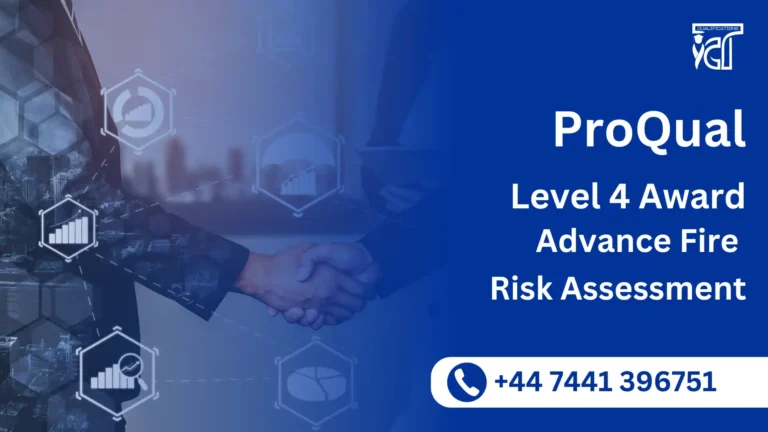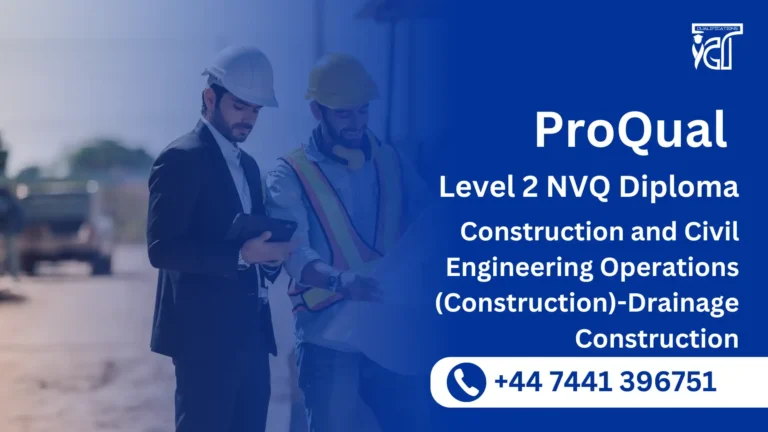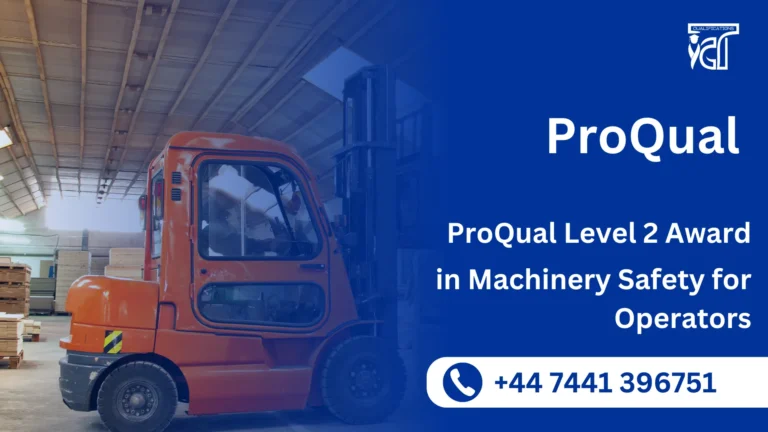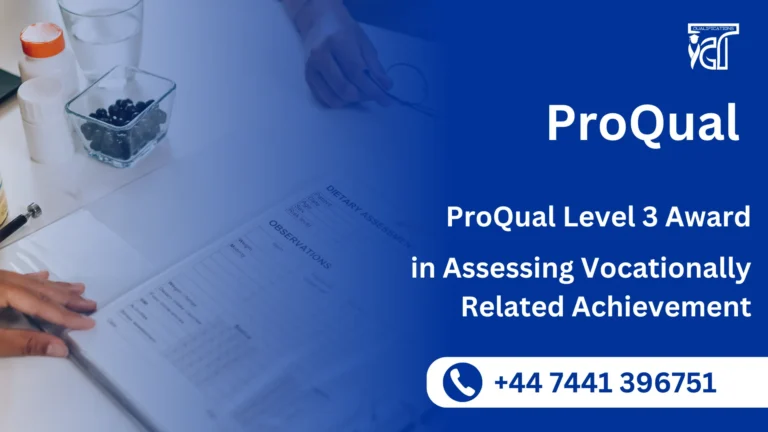In the dynamic and evolving field of surveying, the ProQual Level 3 Diploma in Engineering Surveying (Land Surveying) offers a comprehensive foundation for aspiring professionals. This Ofqual-regulated qualification is designed to provide you with the necessary knowledge and skills to succeed in land surveying and engineering surveying roles. Whether you’re looking to take your first step into the surveying industry or enhance your current expertise, this qualification provides an ideal platform for your career.
The ProQual Level 3 Diploma in Engineering Surveying (Land Surveying) is entirely assignment-based, ensuring you gain practical, real-world experience that can be immediately applied to your career. The course is highly flexible, allowing you to demonstrate your competencies through assignments that are tailored to your work environment.
The ProQual Level 3 Diploma in Engineering Surveying (Land Surveying) is designed for those looking to enter or progress in the field of land surveying and engineering surveying. This qualification provides you with the essential skills to accurately measure and assess land, ensuring that you are equipped to work on a variety of construction and engineering projects. The course focuses on practical surveying techniques, land measurement, map reading, and the use of the latest surveying technology.
The course is Ofqual-regulated, meaning that it meets the highest standards of quality and is widely recognized across the UK and internationally. As a totally assignment-based qualification, it allows learners to apply their theoretical knowledge to real-world scenarios, ensuring they gain valuable, hands-on experience.
The ProQual Level 3 Diploma in Engineering Surveying (Land Surveying) is structured to provide a comprehensive understanding of the skills and knowledge required to work in land surveying and related fields. The qualification covers a range of topics, including surveying methods, technical equipment usage, data interpretation, and health and safety standards.
Throughout the course, you’ll be required to complete assignments that assess your practical abilities in a range of surveying tasks. These assignments are designed to reflect real-world situations, allowing you to develop skills that will directly benefit your career. The entirely assignment-based assessment structure ensures that you gain the experience necessary to work in a professional capacity from day one.
The ProQual Level 3 Diploma in Engineering Surveying (Land Surveying) is an excellent qualification for anyone looking to enter or progress in the field of surveying. With its Ofqual-regulated status, practical, assignment-based learning, and broad range of study units, this diploma provides you with the essential skills and qualifications needed to succeed in land surveying roles.
ProQual Level 1 Award in Understanding Carbon Awareness and Energy Management
ProQual Level 1 Award in Understanding Carbon Awareness and Energy Management consists of 1 mandatory unit having 10 Guided learning hours.
| Sr# | Unit Title | Unit Level | GLH |
|---|---|---|---|
| 1 | Carbon Awareness and Energy Management | 1 | 10 |
GLH (Guided Learning Hours) and TQT (Total Qualification Time) are terms commonly used in vocational qualifications to help define the amount of time a learner is expected to spend on their studies.
1. GLH (Guided Learning Hours)
GLH refers to the number of hours a learner spends being directly taught, supervised, or supported during their course. This includes the time spent in activities such as:
- Classroom instruction
- Practical workshops
- One-on-one tutoring or mentoring sessions
- Online learning sessions with tutor support
In other words, GLH represents the time that learners are actively engaged with their instructors or learning activities.
2. TQT (Total Qualification Time)
TQT represents the total amount of time a learner is expected to invest in completing a qualification, including:
- GLH (Guided Learning Hours): Time spent on direct learning, as explained above.
- Self-Directed Learning: This includes time spent on independent study, research, assignment completion, preparation for exams, and any other work the learner does outside of direct teaching hours.
TQT is a broader measure that includes all the time required to achieve the qualification. It helps learners and employers understand the overall commitment required for the qualification.
Key Differences Between GLH and TQT:
- GLH focuses on direct learning with guidance or supervision.
- TQT includes GLH as well as independent study time and other learning-related activities.
Example:
If a qualification has a TQT of 600 hours and a GLH of 250 hours, it means the learner should spend 250 hours in direct learning (classroom, online, or tutor-led sessions) and 350 hours on independent study or research.
ProQual Level 1 Award in Understanding Carbon Awareness and Energy Management
Carbon Awareness and Energy Management
- Understand what is meant by energy and carbon emissions
- Understand the importance of energy consumption monitoring
- Understand the link between energy consumption and usage of equipment
- Understand the purpose and role of energy reporting
- Understand how to save energy and reduce carbon emissions
Benefits of the ProQual Level 1 Award in Understanding Carbon Awareness and Energy Management
The ProQual Level 1 Award in Understanding Carbon Awareness and Energy Management is designed to provide foundational knowledge of carbon management and energy efficiency. This qualification offers several benefits, particularly for those starting their journey in sustainability and energy management:
1. Introduction to Carbon Awareness and Energy Management
- The course offers a comprehensive introduction to the concepts of carbon emissions and energy management. It provides learners with a basic understanding of how energy is consumed and how carbon footprints are calculated, which is essential for anyone entering the field of sustainability or energy efficiency.
2. Cost-Effective Qualification
- As a Level 1 qualification, this course is often more affordable compared to higher-level qualifications. It offers an accessible entry point into the field of carbon management and energy efficiency without a significant financial investment.
3. Practical Application
- The course focuses on practical, real-world knowledge that can be immediately applied in everyday life or in a work setting. It helps learners identify opportunities for reducing energy consumption and carbon emissions, promoting sustainability at home or within an organization.
4. Flexibility in Learning
- The assignment-based nature of the qualification offers flexibility, allowing learners to complete coursework at their own pace and balance their studies with work and personal commitments.
5. Raise Awareness of Sustainable Practices
- Learners will gain insights into sustainable energy practices and strategies for minimizing carbon footprints, both on a personal and organizational level. This is essential for individuals looking to contribute to reducing environmental impact.
6. Foundation for Further Studies
- This Level 1 qualification serves as a stepping stone for further studies in carbon management, sustainability, or energy efficiency. It provides learners with the knowledge and confidence to pursue higher-level qualifications in these areas.
7. Boosts Career Opportunities in Sustainability
- For individuals looking to pursue a career in sustainability or environmental management, this qualification demonstrates an early commitment to understanding carbon management and energy efficiency. It can help make candidates more attractive to employers in industries such as energy, manufacturing, and public services.
8. Supports Personal Sustainability Goals
- The course helps individuals develop a better understanding of how they can reduce their personal carbon footprint and energy consumption, contributing to broader environmental efforts in their daily lives.
9. Helps Organizations Meet Sustainability Goals
- For business owners, this qualification provides insights into how energy use and carbon emissions can be managed in the workplace. It aids in promoting sustainability, which is increasingly important for companies aiming to enhance their corporate social responsibility (CSR) efforts.
10. Promotes Environmental Responsibility
- By completing the course, learners can become more environmentally conscious and gain the tools to take actionable steps toward reducing energy consumption and minimizing environmental harm. This helps foster a culture of sustainability within their communities or organizations.
The ProQual Level 1 Award in Understanding Carbon Awareness and Energy Management is designed for individuals who are looking to gain foundational knowledge in sustainability, energy efficiency, and carbon management. This course is ideal for a wide range of learners, whether they are just starting out in the field or looking to expand their awareness of energy management practices. Below are the key groups who will benefit most from this qualification:
1. Individuals New to Sustainability and Energy Management
- This course is perfect for beginners who have little to no experience in sustainability or energy management. It provides an introduction to basic concepts such as carbon emissions, energy consumption, and practical steps to reduce environmental impact. It’s ideal for anyone looking to start their career in this field.
2. Students Interested in Environmental Studies
- Students who are pursuing environmental studies or related courses can use this qualification as an introductory credential to expand their knowledge of carbon management and energy efficiency. It complements academic studies and adds practical value to their educational background.
3. Employees in Energy or Environmental Roles
- Entry-level employees or those looking to shift into roles related to sustainability or energy management will find this course beneficial. It gives them a basic understanding of the energy systems and carbon reduction strategies they may encounter in their jobs, helping them become more effective in their roles.
4. Small Business Owners and Managers
- For small business owners or managers, this course is an excellent way to learn the basics of energy efficiency and sustainability. Understanding how to reduce energy use and carbon emissions can lead to cost savings and improve the sustainability profile of the business, making this qualification highly practical.
5. Individuals Interested in Personal Sustainability
- This qualification is also ideal for individuals who are passionate about living more sustainably. Those interested in reducing their carbon footprint or learning how to make environmentally responsible decisions in their daily lives can benefit from this course.
6. Individuals Exploring Career Changes
- Professionals looking to transition into the sustainability or energy management sectors will find this qualification valuable. It provides a solid foundation to build upon, making it easier to pursue further education or career opportunities in the growing field of sustainability.
7. Environmental Advocates and Activists
- Individuals who are passionate about environmental protection and want to learn more about carbon awareness and energy management can use this qualification to deepen their understanding and advocate for more sustainable practices in their communities or through their work.
8. Teachers or Trainers in Environmental Education
- Teachers or trainers who want to educate others about the importance of carbon management and energy efficiency will find this course a helpful resource. It provides them with the necessary tools and knowledge to teach these critical concepts effectively.
Entry Requirements
Register Now
Qualification Process
Qualification Process for the ProQual Level 1 Award in Understanding Carbon Awareness and Energy Management
- Self-Assessment:
Begin by evaluating your eligibility to ensure you meet the qualification requirements, including work experience, knowledge, and language proficiency. - Registration:
Complete your registration by submitting the required documents, including a scanned copy of a valid ID, and paying the registration fee. - Induction:
An assessor will conduct an induction to confirm your eligibility for the course and explain the evidence requirements. If you do not meet the criteria, your registration will be canceled, and the fee will be refunded. - Assignmnets & Evidence Submission:
Provide all assignmnets and the necessary evidence based on the assessment criteria outlined in the course. If you are unsure of the required evidence, consult with the assessor for guidance on the type and nature of evidence needed. - Feedback and Revision:
The assessor will review your submitted evidence and provide feedback. Evidence that meets the criteria will be marked as “Criteria Met,” while any gaps will be identified. You will be asked to revise and resubmit if needed. - Competence Evidence:
Submit final evidence demonstrating that all learning outcomes have been met. This evidence will be marked as “Criteria Met” by the assessor once it is satisfactory. - Internal Quality Assurance (IQA):
The Internal Quality Assurance Verifier (IQA) will review your evidence to ensure consistency, quality, and compliance with standards. - External Verification:
The IQA will submit your portfolio to ProQual’s External Quality Assurance Verifiers (EQA) for final confirmation. The EQA may contact you directly to verify the authenticity of your evidence. - Certification:
Upon successful completion of all checks, ProQual will issue your official certificate, confirming that you have attained the ProQual Level 1 Award in Understanding Carbon Awareness and Energy Management.







